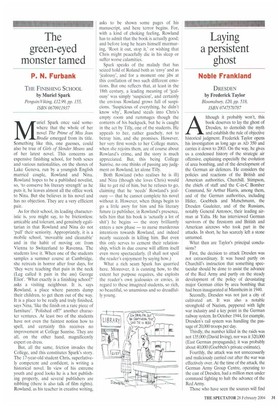The green-eyed monster tamed
P. N. Furbank
THE FINISHING SCHOOL by Muriel Spark Penguin/Viking, £12.99, pp. 155,
ISBN 0670911937
Muriel Spark once said somewhere that the whole of her novel The Prime of Miss Jean Brodie emerged from its title. Something like this, one guesses, could also be true of Girls of Slender Means and of her latest novel. This concerns an expensive finishing school, for both sexes and various nationalities, on the shores of Lake Geneva, run by a youngish English married couple, Rowland and Nina. Rowland hopes to be a published novelist, so, to conserve his literary strength' as he puts it, he leaves almost all the office work to Nina. But she believes in his novel and has no objection. They are a very efficient pair.
As for their school, its leading characteristic is, you might say, to be frictionless; amicable and tolerant, and genuinely egalitarian in that Rowland and Nina do not 'pull' their seniority. Appropriately, it is a mobile school, 'moveable and cleanable' and in the habit of moving on; from Vienna to Switzerland to Ravenna. The students love it. When one of the students samples a summer course at Cambridge, she retreats in horror after four days, for 'they were teaching that pain in the neck (Leg called it pain in the ass) George Eliot'. 'What exactly is a finishing school?' asks a visiting neighbour. It is, says Rowland, a place where parents dump their children, to get them out of the way. It is a place to be really and truly finished, says Nina, 'like the finish on a rare piece of furniture'. 'Polished off?' another character ventures. At least two of the students have not even the faintest notion how to spell, and certainly this receives no improvement at College Sunrise. They are all, on the other hand, magnificently expert on dress.
But, all the same, friction invades the College, and this constitutes Spark's story. The 17-year-old student Chris, superlatively competent and confident, is writing a historical novel. In view of his extreme youth and good looks he is a hot publishing property, and several publishers are nibbling (there is also talk of film rights). Rowland, as his teacher in creative writing, asks to be shown some pages of his manuscript, and here terror begins. For, with a kind of choking feeling, Rowland has to admit that the book is actually good; and before long he hears himself murmuring, 'Root it out, stop it,' or wishing that Chris might peacefully die in his sleep or suffer worse calamities.
Spark speaks of the malady that has seized hold of Roland both as 'envy' and as 'jealousy', and for a moment one jibs at this conflation of two such different emotions. But one reflects that, at least in the 18th century, a leading meaning of 'jealousy' was simply 'suspicion', and certainly the envious Rowland grows full of suspicions. 'Suspicious of everything, he didn't know why', Rowland steals into Chris's empty room and rummages though the contents of his backpack, but he is caught in the act by Tilly, one of the students. He appeals to her, rather gauchely, not to betray him, and she promises. However, her very first words to her College mates, when she rejoins them, are of course about Rowland's crime, and the story is much appreciated. But, this being College Sunrise, no one thinks of passing any judgment on Rowland, let alone Tilly.
Both Rowland (who realises he is ill) and Nina (though she loves Chris) would like to get rid of him, but he refuses to go, claiming that he `needs' Rowland's jealousy — that he cannot complete his novel without it. However, when things begin to go a little awry for him and his literary future (a publisher, in Rowland's presence, tells him that his book is `actually a lot of shit') he begins — the story brilliantly enters a new phase — to nurse murderous intentions towards Rowland, and indeed nearly succeeds in killing him. But even this only serves to cement their relationship, which in due course will affirm itself even more spectacularly. (I shall not spoil the reader's enjoyment by saying how.) What a rich seam Spark has quarried here. Moreover, it is cunning how, to the extent her purpose requires, she exploits the reader's own jealousies or envies, in regard to these imagined students, so rich, so beautiful, so unanxious and so dreadfully young.


























































 Previous page
Previous page